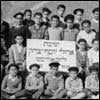An event in Israel marked the 110th anniversary of the opening of Tomchei Tmimim Lubavitch, founded in 1897 by the Fifth Lubavitcher Rebbe, Rabbi Shalom Dovber, of righteous memory.
The Rebbe announced the yeshiva's founding on the 15th of the Hebrew month of Elul during the wedding feast of his son, the future Sixth Lubavitcher Rebbe, Rabbi Yosef Yitzchak Schneersohn, of righteous memory. In the more than a century since, the yeshiva, with branches in locations across the globe, has lived up to the Rebbe's vision: a place where the study of Talmud, Jewish Law and Chassidic Thought would be integrated into an inspiring curriculum that would produce graduates dedicated to serving every single Jew.
"The students of the Chabad yeshivah were known for their self-giving," said Rabbi Shlomo Amar, Chief Rabbi of Israel, during the celebration in Kfar Chabad. "The entire education was based on giving to others."
With thousands learning today in Chabad yeshivas, celebrants in Kfar Chabad remembered the days when school were operated under difficult and dangerous conditions.
"I cannot fathom in my mind today when the Lubavitch emissaries arrived in Morocco," said Amar, referring to several Chabad rabbis who were dispatched to the North African country in the early 1950s to establish educational institutions there. "They did not know the language, the way of the land; they did not come to [merely] survive there, rather they came to educate others."
The first Tomchei Tmimim opened its doors in the town of Lubavitch, in those days part of White Russia, Belarus. Shortly after the revolution, the Soviets closed the yeshiva, forcing the institution to go underground and expand in order to educate children across the Soviet Union.
"My father informed me when I was not 12 years old that the next year I was going to learn in Samarkand, [Uzbekistan]," said Lev Leviev, a Russian-Israeli billionaire originally from Tashkent, Uzbekistan and the primary benefactor of the network of Ohr Avner Chabad day schools across the former Soviet Union. "I was informed that I am going to learn Torah. [My father] did not say much, [all he said was that] you are not going to any uncles or aunts.
"It was an extremely secret operation," continued Leviev, turning to what learning Torah meant in those days. "They warned me not to speak to anyone. It [was] life threatening if you did. When I arrived to a certain house, they told me to take my suitcase and go on the way. We arrived to some place in the city, a house. Everything was very quiet and done secretly.
"There we learned Torah," he went on. "I remember not having some hot food for an entire year. We ate dietetic food – vegetables, onion. We left the building just once a month in the dark, one by one. We were warned not to look back or forward. Once I remember we were walking and we felt that someone was following us. We felt that we were on the verge of being caught. I will never forget that moment."
But in spite of the difficulties incurred, Leviev said the experience changed his life. In particular, he learned as a student the importance of giving tzedakah, charity, he said.
"When I left [Tashkent, my father] gave me an envelope to give to 'someone' when I arrived at the yeshivah. I came to the school, placed my suitcase under the bed and opened the envelope. In it was a wad of 25 ruble bills. One bill [alone] was a month's [salary]. It was a lot of money. I thought to myself, to whom do I have to give so much money?"
He said that he took the money with him wherever he went.
"One day, an old man came to me and said that he just came from Tashkent and that my father told him that I had something for him," said Leviev. "In essence that was my first education. I learned that one should always give money to another [person] for tzedakah."
The Growth of Today

"Once, they used to say that there were 50 students in the yeshivah," he said. "Now, no one knows the exact number of students there are in Chabad."
He attributed the success to the students who benefit from a Chabad education. Offering himself as an example, he pointed to the newly opened Tomchei Tmimim in the Israeli town of Kfar Sitrin. It serves immigrants from Uzbekistan and already has a student body of 220.
"I think that the atmosphere [of giving] and the teaching to give to others, that in itself is the school's success," said Leviev. "Every student that comes out of the school knows that their goal in life is [to help] the next generation."







Start a Discussion